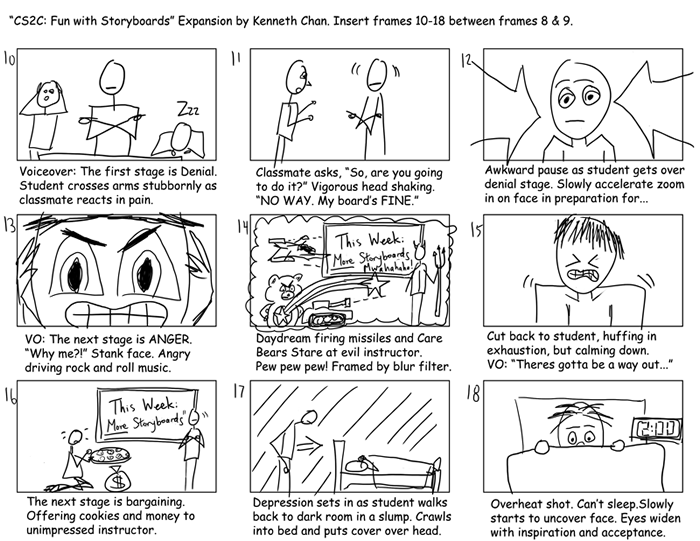Teamwork - Acting on Crisis
Learning Outcomes
Upon completion of this lesson's material, students will be able to:
- Demonstrate their ability to contribute to a team-based crisis situation.
- Facilitate the contribution of multiple team members.
- Work both in and outside the group to complete a group task.
- Foster a constructive team climate.
- Respond appropriately to within-team conflict and resolution.
Instructions
This assignment is a semester-long group project to write, produce, and perform a dramatic play. Individual students will work in groups to develop all aspects of the play including casting, costumes, set design, production, script writing, acting, and performing. Each member will be evaluated based on their individual contributions to the production of the play based on the rubric below.
Guidelines for the Play
The play itself will also need to focus on team process. The play will need to meet the following criteria:
- Subject matter of the play will be to act out a crisis intervention scenario involving a fictitous client and a team of mental health professionals who stage an intervention.
- There is no specific guidelines as to what kind of "crisis" needs to be identified.
- The play will progress for no less than 30 minutes of action.
- The play will involve a principle actor as a client (though family members may also be included).
- The play will involve a principle Crisis Intervention worker.
- The crisis will be of a nature that several community members and agencies become involved in the crisis.
- The play will need to exemplify how the Crisis Intervention worker interacts and coordinates activities with other community providers.
- The play will have to highlight a specific conflict (approach, philosophy, or value) between providers, or between providers and the client (or family members) and the play must exemplify a successful and appropriate application of intervention skills that resolves this conflict and moves the intervention forward.
- The play may involve humor but should still demonstrate serious understanding of the incidence of crisis.
- No one dies.
- Students will perform the play (without script) and the plays will be filmed.
- Performance of the plays may be open to other members of the KVCC community.
Group Process and Teamwork
Creative interaction between members of the production team (the students in the group) is critical. Assigning roles such as writers, producers, directors, and actors is essential for success. Group process should expect to consider the following issues:
- Leadership and follower-ship is critical to any group's functioning.
- Roles (writers, producers, directors, set designers, and actors - see below for definitions) should be defined early.
- Individuals may hold multiple roles but the group should function so that EVERYONE has specific and essential duties to perform.
- Groups must be self-regulating. The goal is for the group to work together on the project, which may entail working out conflict that comes about in the group. Faculty intervention should be kept to a minimum. (However, if situations arise that are unworkable, it is vital that the members of the group bring the Faculty member in.)
- The product of the group process (the play) will be the responsibility of the whole group...some individuals may contribute more than others (this is a normal nature of groups) but the play will be evaluated equally among ALL the members of the group. This is NOT a competition as to who did MORE for the SUCCESS of the play.
- This project is a major class project, will be graded as such, and must be taken seriously. Students who lack the maturity to approach a creative and innovative project like this will be asked to drop the class.
Definitions of Roles
While there are many roles involved in producing a play (you can see this when you see the titles at the end of a movie going on and on!) there are assential functional roles that MUST be considered:
- Producers - Producers are the definitive leaders of the production team. They are responsible for schedules, budgets, managing all the members of the team, and are responsible for all the fine details of communication between production team members. They have the big picture in mind, what it is all going to look like and how it is going to happen.
- Directors - Directors work closely with the Producer, Writers, and Actors to bring about the actual performance. They usually occupy the vantage point of the audience and provide stage direction, stage movement, and guidance to actors on how to best play their roles. They also strive to find the best qualities in the actors themselves and nurture actor creativity and innovation. They often play a critical role in casting which actors should play which parts.
- Writers - If there is no script, there is no play! Writers construct the staging and dialogue of the play. Writers tell the "story" and ultimately produce the "script" which outlines each players general movements, set, and dialogue for the duration of the performance.
- Actors - What can we say about actors? They are the ones out front when it comes to the actual performance. Good actors seek to bring out the deep qualities of the characters they play (getting "into character") and have a goal to convince the audience that the action they are seeing on the stage is REAL! Actors need to work hard to get beyond simply memorizing lines and into performing their character. They also contribute actively to the writing of the script and the staging and dialoge of the play as they express what their "character" would do or say in certain circumstances. At the same time, these creative individuals also need to be able to support the demands of the script and the Director.
- Set Design and Support - These essential people create and manage the props, staging, lighting, costumes, make-up, and even refreshments for the entire production. They can also be the "gofers" who seek out props and other items to meet the demands of the project. These roles would also include filming and any technological management that may be required for the production.
Production Process
There are going to be steps in this process.
Step 1: Write the Script
The first step is to create the characters, the scenario, and write everyone's lines! This should be as detailed as possible. Your group will put this together collaboratively.
Step 2: Storyboard and Production Plan
In this step you are going to outline the general scenes of your production...something that movie makers call "Storyboarding"
It is very important to plan out your scenes so when it comes to filming them you can do so in an organized way.
This is another document to produce collaboratively. You should create a document that oulines each scene and what will be happening. Each scene should be on a separate page.
There are all sorts of apps to do this professionally but they are expensive. You can do a search on "Storyboards" and see some examples (though yours does not have to be as elaborate! Here is an example of a hand-drawn story board.

Shoot the Video
Get your team together and produce the video. You will be using the features on your iPad to film and edit the video and then uploading the video to YouTube for sharing.
There are some choices in terms of how you want to create a recording. For more information on creating videos on your iPad click HERE. |
Teamwork Evalution
The second evaluation will focus on individual contributions to the team by each member. This grade will be produced collectively by the members of the team during the formal "Cast Party" which will occur some time after the actual production. The Faculty member will facilitate an open and honest dialogue with all the members of the production team together. Each members individual strengths, weaknesses, and contributions to the process will be discussed and rated. The scoring of this will be "gentle" in order to encourage honest other- and self-evaluation. Evaluations will very much take ROLE into consideration.
The grade that a student gets on this portion of the evaluation will constitute 20% of the grade that each student receives.
A modified for of the VALUE Rubric for Teamwork will be used to evaluate each members activity in the group. Categories that will be explored include:
- Contributions as a team member
- Facilitating the contributions of other team members
- Contributions to the team outside of team meetings
- Fostering a constructive team climate
- Response to conflict
Click here to download the form the group will be using to evaluate individual performance.
